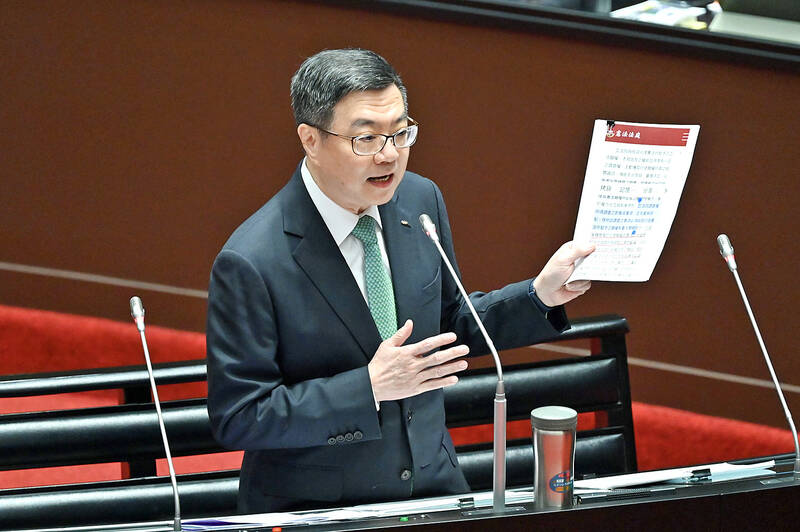The government could seek a constitutional interpretation if lawmakers vote down its motion to reconsider legislative reform bills today, Premier Cho Jung-tai (卓榮泰) said yesterday.
Cho made the comments during a session at the Legislative Yuan on the eve of today’s floor vote on the motion, which is expected to be rejected by the opposition parties’ combined majority.
The legislature is urged to give serious thought to discussing the merits of the bills and ensure their consistency with other legislation and its acceptability among Taiwanese, he said.

Photo: George Tsorng, Taipei Times
The bills would amend the Act Governing the Legislative Yuan’s Power (立法院職權行使法) and the Criminal Code, authorizing lawmakers to call private citizens and officials to testify at investigative hearings or face fines and — in the case of officials — jail time.
The government does not rule out seeking a constitutional remedy to overturn the laws should the Legislative Yuan insist on passing them, Cho said, adding that officials would make the move after consulting lawyers and academics.
The remedies include asking the Constitutional Court to rule on the legislation and calling for a temporary injunction to suspend promulgation until judges settle the matter, he said.
Minister of Justice Cheng Ming-chien (鄭銘謙) said the bills are an overreach, as the legislature’s ability to conduct investigations is a subsidiary power and must abide by Constitutional Interpretation No. 585.
The interpretation stipulates that the Legislative Yuan may not extend its investigative power to a matter “related to the independent exercise of powers by an organ of the state ... guaranteed by the Constitution.”
“An executive chief, by the authority inherent in his or her executive powers, is entitled to decide not to make public any information that may affect or interfere with the effective operation of the executive branch,” it says.
The bills broaden the legislature’s power beyond its constitutional scope and empower lawmakers to arbitrarily impose penalties on private citizens for refusing to comply with their demands to testify, Cheng said.
The ministry deems the proposed laws to be “profoundly inappropriate” and believes their promulgation would lead to “social upheaval,” he said.
Democratic Progressive Party (DPP) Legislator Huang Jie (黃捷) said the bills would enable lawmakers to impose penalties on officials for the crime of “counter interpellation,” a word that does not exist in legislative rules or law books.
Chinese Nationalist Party (KMT) lawmakers gave the phrase varying and mutually exclusive definitions, including providing an irrelevant answer, responding to a question with a question and being mean, she said during the session.
DPP Legislator Chuang Ruei-hsiung (莊瑞雄) said that the bills’ provisions authorizing fines of up to NT$100,000 for people who refuse to testify dwarfs the punishment for not appearing before a court after being served with a subpoena, which carries at most a NT$30,000 fine.
KMT Legislator Wang Yu-min (王育敏) said that the government had given “conflicting” statements, as Cho had previously voiced support for legislative reforms.
Cho’s comments suggesting that the amendments lacked restrictions were incorrect, as hearings could only be held on “important matters concerning the public,” Wang said.
The amendments merely sought to address the long-standing problem of insufficient oversight of the executive branch, she added.
Additional reporting by Chen Cheng-yu

The CIA has a message for Chinese government officials worried about their place in Chinese President Xi Jinping’s (習近平) government: Come work with us. The agency released two Mandarin-language videos on social media on Thursday inviting disgruntled officials to contact the CIA. The recruitment videos posted on YouTube and X racked up more than 5 million views combined in their first day. The outreach comes as CIA Director John Ratcliffe has vowed to boost the agency’s use of intelligence from human sources and its focus on China, which has recently targeted US officials with its own espionage operations. The videos are “aimed at

STEADFAST FRIEND: The bills encourage increased Taiwan-US engagement and address China’s distortion of UN Resolution 2758 to isolate Taiwan internationally The Presidential Office yesterday thanked the US House of Representatives for unanimously passing two Taiwan-related bills highlighting its solid support for Taiwan’s democracy and global participation, and for deepening bilateral relations. One of the bills, the Taiwan Assurance Implementation Act, requires the US Department of State to periodically review its guidelines for engagement with Taiwan, and report to the US Congress on the guidelines and plans to lift self-imposed limitations on US-Taiwan engagement. The other bill is the Taiwan International Solidarity Act, which clarifies that UN Resolution 2758 does not address the issue of the representation of Taiwan or its people in

US Indo-Pacific Commander Admiral Samuel Paparo on Friday expressed concern over the rate at which China is diversifying its military exercises, the Financial Times (FT) reported on Saturday. “The rates of change on the depth and breadth of their exercises is the one non-linear effect that I’ve seen in the last year that wakes me up at night or keeps me up at night,” Paparo was quoted by FT as saying while attending the annual Sedona Forum at the McCain Institute in Arizona. Paparo also expressed concern over the speed with which China was expanding its military. While the US

SHIFT: Taiwan’s better-than-expected first-quarter GDP and signs of weakness in the US have driven global capital back to emerging markets, the central bank head said The central bank yesterday blamed market speculation for the steep rise in the local currency, and urged exporters and financial institutions to stay calm and stop panic sell-offs to avoid hurting their own profitability. The nation’s top monetary policymaker said that it would step in, if necessary, to maintain order and stability in the foreign exchange market. The remarks came as the NT dollar yesterday closed up NT$0.919 to NT$30.145 against the US dollar in Taipei trading, after rising as high as NT$29.59 in intraday trading. The local currency has surged 5.85 percent against the greenback over the past two sessions, central